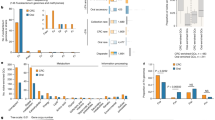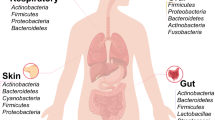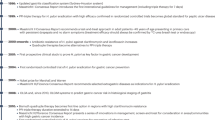Abstract
Background
Urinary microbiota is implicated in many diseases of the urinary tract. The aim of this study was to perform a systematic review of the role of urinary microbiota in prostatic diseases.
Methods
A PubMed/Medline search was undergone from inception through June 2022 for studies investigating urinary microbiota alterations in prostatic diseases, subdivided into benign prostatic hyperplasia (BPH), prostate cancer (PCa), and chronic prostatitis (CP). Study selection followed the PRISMA statement. Phylum, family, genus and species of each bacterium in cancer patients and controls were recorded. Quality of included studies was evaluated using the Critical Appraisal Skills Program (CASP) checklist for non-randomized studies.
Results
A total of 16 studies (4 studies on BPH, 9 studies on PCa and 3 studies on CP) comprising 1486 patients were included in our final analysis. Patients with BPH had a different urinary microbial composition, with a certain pattern proven to be associated with a higher lower urinary tract symptoms severity. Regarding PCa, some bacterial phyla/genera/classes/species were more abundant in PCa and others predicted a higher grade disease. In patients with CP, a different microbiota composition and a higher diversity were found, with the symptom severity being influenced mainly by microbiota composition, favoring aerobic microorganisms.
Conclusion
Urinary microbiota is implicated in prostatic diseases, especially in BPH, PCa and CP. However, given the relative heterogeneity among published studies, this implication suggests better delineation is needed. Further studies are needed to confirm these findings.
This is a preview of subscription content, access via your institution
Access options
Subscribe to this journal
Receive 4 print issues and online access
$259.00 per year
only $64.75 per issue
Buy this article
- Purchase on Springer Link
- Instant access to full article PDF
Prices may be subject to local taxes which are calculated during checkout



Similar content being viewed by others
References
Banerjee S, Robertson ES. Future Perspectives: Microbiome, Cancer and Therapeutic Promise. In: Robertson ES, editor. Microbiome and Cancer. Cham: Springer International Publishing; 2019 [cited 2022 May 15]. p. 363–89. (Current Cancer Research). Available from: https://doi.org/10.1007/978-3-030-04155-7_17
Integrative HMP (iHMP) Research Network Consortium The integrative human microbiome project. Nature. 2019;569:641–8.
Lynch SV, Pedersen O. The human intestinal microbiome in health and disease. N Engl J Med. 2016;375:2369–79.
Mjaess G, Karam A, Aoun F, Albisinni S, Roumeguère T. Fecal microbiota transplantation for immunotherapy-resistant urological tumors: Is it time? An update of the recent literature. Cancer. 2022;128:14–9.
Li JKM, Wang LL, Wong CYP, Chiu PKF, Teoh JYC, Kwok HSW, et al. A cross-sectional study on gut microbiota in prostate cancer patients with prostatectomy or androgen deprivation therapy. Prostate Cancer Prostatic Dis. 2021;24:1063–72.
Kure A, Tsukimi T, Ishii C, Aw W, Obana N, Nakato G, et al. Gut environment changes due to androgen deprivation therapy in patients with prostate cancer. Prostate Cancer Prostatic Dis. 2022. Online ahead of print.
Karstens L, Asquith M, Davin S, Stauffer P, Fair D, Gregory WT, et al. Does the urinary microbiome play a role in urgency urinary incontinence and its severity? Front Cell Infect Microbiol. 2016;6:78.
Abernethy MG, Tsuei A. The bladder microbiome and interstitial cystitis: is there a connection? Curr Opin Obstet Gynecol. 2021;33:469–73.
Li K, Chen C, Zeng J, Wen Y, Chen W, Zhao J, et al. Interplay between bladder microbiota and overactive bladder symptom severity: a cross-sectional study. BMC Urol. 2022;22:39.
Lee HY, Wang JW, Juan YS, Li CC, Liu CJ, Cho SY, et al. The impact of urine microbiota in patients with lower urinary tract symptoms. Ann Clin Microbiol Antimicrob. 2021;20:23.
Bajic P, Dornbier RA, Doshi CP, Wolfe AJ, Farooq AV, Bresler L. Implications of the genitourinary microbiota in prostatic disease. Curr Urol Rep. 2019;20:34.
Kim MS, Jung SI. The urinary tract microbiome in male genitourinary diseases: focusing on benign prostate hyperplasia and lower urinary tract symptoms. Int Neurourol J. 2021;25:3–11.
Porter CM, Shrestha E, Peiffer LB, Sfanos KS. The microbiome in prostate inflammation and prostate cancer. Prostate Cancer Prostatic Dis. 2018;21:345–54.
Javier-DesLoges J, McKay RR, Swafford AD, Sepich-Poore GD, Knight R, Parsons JK. The microbiome and prostate cancer. Prostate Cancer Prostatic Dis. 2022;25:159–64.
Karam A, Mjaess G, Albisinni S, El Daccache Y, Farah M, Daou S, et al. Uncovering the role of urinary microbiota in urological tumors: a systematic review of literature. World J Urol. 2022;40:951–64.
Aragón IM, Herrera-Imbroda B, Queipo-Ortuño MI, Castillo E, Del Moral JSG, Gómez-Millán J, et al. The urinary tract microbiome in health and disease. Eur Urol Focus. 2018;4:128–38.
Cavarretta I, Ferrarese R, Cazzaniga W, Saita D, Lucianò R, Ceresola ER, et al. The microbiome of the prostate tumor microenvironment. Eur Urol. 2017;72:625–31.
Henning JD, Bonachea LA, Bunker CH, Patrick AL, Jenkins FJ. Human herpesvirus 8 infection contributes to a T helper 2 immune response in men from Tobago with prostate cancer. Int J Urol J Jpn Urol Assoc. 2017;24:64–8.
Yang L, Xie S, Feng X, Chen Y, Zheng T, Dai M, et al. Worldwide prevalence of human papillomavirus and relative risk of prostate cancer: a meta-analysis. Sci Rep. 2015;5:14667.
Page MJ, McKenzie JE, Bossuyt PM, Boutron I, Hoffmann TC, Mulrow CD, et al. The PRISMA 2020 statement: an updated guideline for reporting systematic reviews. BMJ. 2021;372:n71.
Javurek AB, Spollen WG, Ali AMM, Johnson SA, Lubahn DB, Bivens NJ, et al. Discovery of a novel seminal fluid microbiome and influence of estrogen receptor alpha genetic status. Sci Rep. 2016;6:23027.
Feng Y, Ramnarine VR, Bell R, Volik S, Davicioni E, Hayes VM, et al. Metagenomic and metatranscriptomic analysis of human prostate microbiota from patients with prostate cancer. BMC Genomics. 2019;20:146.
Ouzzani M, Hammady H, Fedorowicz Z, Elmagarmid A Rayyan—a web and mobile app for systematic reviews. Syst Rev [Internet]. 2016 [cited 2022 May 25];5. Available from: https://link.springer.com/epdf/10.1186/s13643-016-0384-4
Holland B, Karr M, Delfino K, Dynda D, El-Zawahry A, Braundmeier-Fleming A, et al. The effect of the urinary and faecal microbiota on lower urinary tract symptoms measured by the International Prostate Symptom Score: analysis utilising next-generation sequencing. BJU Int. 2020;125:905–10.
Bajic P, Van Kuiken ME, Burge BK, Kirshenbaum EJ, Joyce CJ, Wolfe AJ, et al. Male bladder microbiome relates to lower urinary tract symptoms. Eur Urol Focus. 2020;6:376–82.
Thomas S, Dunn CD, Campbell LJ, Strand DW, Vezina CM, Bjorling DE, et al. A multi-omic investigation of male lower urinary tract symptoms: Potential role for JC virus. PloS One. 2021;16:e0246266.
Yu H, Meng H, Zhou F, Ni X, Shen S, Das UN. Urinary microbiota in patients with prostate cancer and benign prostatic hyperplasia. Arch Med Sci AMS. 2015;11:385–94.
Alexeyev O, Bergh J, Marklund I, Thellenberg-Karlsson C, Wiklund F, Grönberg H, et al. Association between the presence of bacterial 16S RNA in prostate specimens taken during transurethral resection of prostate and subsequent risk of prostate cancer (Sweden). Cancer Causes Control Ccc 2006;17:1127–33.
Shrestha E, White JR, Yu SH, Kulac I, Ertunc O, De Marzo AM, et al. Profiling the urinary microbiome in men with positive versus negative biopsies for prostate cancer. J Urol. 2018;199:161–71.
Feng Y, Jaratlerdsiri W, Patrick SM, Lyons RJ, Haynes AM, Collins CC, et al. Metagenomic analysis reveals a rich bacterial content in high-risk prostate tumors from African men. Prostate. 2019;79:1731–8.
Alanee S, El-Zawahry A, Dynda D, Dabaja A, McVary K, Karr M, et al. A prospective study to examine the association of the urinary and fecal microbiota with prostate cancer diagnosis after transrectal biopsy of the prostate using 16sRNA gene analysis. Prostate. 2019;79:81–7.
Alanee S, El-Zawahry A, Dynda D, McVary K, Karr M, Braundmeier-Fleming A. Prospective examination of the changes in the urinary microbiome induced by transrectal biopsy of the prostate using 16S rRNA gene analysis. Prostate Cancer Prostatic Dis. 2019;22:446–52.
Shoskes DA, Altemus J, Polackwich AS, Tucky B, Wang H, Eng C. The urinary microbiome differs significantly between patients with chronic prostatitis/chronic pelvic pain syndrome and controls as well as between patients with different clinical phenotypes. Urology 2016;92:26–32.
Wu Y, Jiang H, Tan M, Lu X. Screening for chronic prostatitis pathogens using high-throughput next-generation sequencing. Prostate. 2020;80:577–87.
Kogan M, Naboka Y, Ferzauli A, Ibishev K, Gudima I, Ismailov R. Does the microbiota spectrum of prostate secretion affect the clinical status of patients with chronic bacterial prostatitis? Int J Urol J Jpn Urol Assoc. 2021;28:1254–9.
Bučević Popović V, Šitum M, Chow CET, Chan LS, Roje B, Terzić J. The urinary microbiome associated with bladder cancer. Sci Rep. 2018;8:12157.
Hurst R, Meader E, Gihawi A, Rallapalli G, Clark J, Kay GL, et al. Microbiomes of urine and the prostate are linked to human prostate cancer risk groups. Eur Urol Oncol. 2022;5:412–9.
Perez-Carrasco V, Soriano-Lerma A, Soriano M, Gutiérrez-Fernández J, Garcia-Salcedo JA. Urinary microbiome: yin and yang of the urinary tract. Front Cell Infect Microbiol. 2021;11:617002.
Fouts DE, Pieper R, Szpakowski S, Pohl H, Knoblach S, Suh MJ, et al. Integrated next-generation sequencing of 16S rDNA and metaproteomics differentiate the healthy urine microbiome from asymptomatic bacteriuria in neuropathic bladder associated with spinal cord injury. J Transl Med. 2012;10:174.
Pearce MM, Hilt EE, Rosenfeld AB, Zilliox MJ, Thomas-White K, Fok C, et al. The female urinary microbiome: a comparison of women with and without urgency urinary incontinence. mBio 2014;5:e01283–01214.
Boonanantanasarn K, Gill AL, Yap Y, Jayaprakash V, Sullivan MA, Gill SR. Enterococcus faecalis enhances cell proliferation through hydrogen peroxide-mediated epidermal growth factor receptor activation. Infect Immun. 2012;80:3545–58.
Wu S, Morin PJ, Maouyo D, Sears CL. Bacteroides fragilis enterotoxin induces c-Myc expression and cellular proliferation. Gastroenterology. 2003;124:392–400.
Higuchi R, Goto T, Hirotsu Y, Otake S, Oyama T, Amemiya K, et al. Sphingomonas and phenylobacterium as major microbiota in thymic epithelial tumors. J Pers Med. 2021;11:1092.
Koh GY, Kane A, Wu X, Mason J, Crott J. Parabacteroides distasonis attenuates tumorigenesis, modulates inflammatory markers, and promotes intestinal barrier integrity in azoxymethane-treated mice (OR04-02-19). Curr Dev Nutr. 2019;3 Suppl 1:nzz030.OR04-02-19.
Lozano-Lorca M, Salcedo-Bellido I, Olmedo-Requena R, Castaño-Vinyals G, Amiano P, Shivappa N, et al. Dietary inflammatory index and prostate cancer risk: MCC-Spain study. Prostate Cancer Prostatic Dis. 2022. Online ahead of print.
Author information
Authors and Affiliations
Contributions
Conceptualization: GM, CDN and SA. Data acquisition: GM and AK. Data analysis: GM, AK and SA. Manuscript writing—first draft: GM, AK, TR and SA. Manuscript writing—review and editing: TR, RD, FA, KM, JM, CDN and SA. Supervision: TR, CDN and SA.
Corresponding author
Ethics declarations
Competing interests
The authors declare no competing interests.
Additional information
Publisher’s note Springer Nature remains neutral with regard to jurisdictional claims in published maps and institutional affiliations.
Rights and permissions
Springer Nature or its licensor holds exclusive rights to this article under a publishing agreement with the author(s) or other rightsholder(s); author self-archiving of the accepted manuscript version of this article is solely governed by the terms of such publishing agreement and applicable law.
About this article
Cite this article
Mjaess, G., Karam, A., Roumeguère, T. et al. Urinary microbiota and prostatic diseases: the key for the lock? A systematic review. Prostate Cancer Prostatic Dis 26, 451–460 (2023). https://doi.org/10.1038/s41391-022-00602-w
Received:
Revised:
Accepted:
Published:
Issue Date:
DOI: https://doi.org/10.1038/s41391-022-00602-w
This article is cited by
-
The diagnostic yield of the Meares & Stamey test can be significantly improved by symptom-based patient selection and the experience of the test performer
Prostate Cancer and Prostatic Diseases (2024)
-
Yoga, benign prostatic hyperplasia and lower urinary tract symptoms: a new path for clinical trials
Prostate Cancer and Prostatic Diseases (2024)
-
Changes in the gut microbial profile during long-term androgen deprivation therapy for prostate cancer
Prostate Cancer and Prostatic Diseases (2023)



